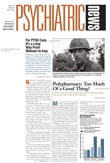Children of alcoholics or drug abusers are known to be at high genetic risk for alcoholism or drug-abuse themselves. But how is that genetic risk transmitted? Perhaps through alcohol-dependency or drug-dependency genes. Or perhaps through personality. After all, personality has been found to be moderately heritable.
Thus, Irene Elkins, Ph.D., co-investigator with the Minnesota Center for Twin and Family Research at the University of Minnesota, and colleagues undertook a study to determine whether particular personality traits constitute risk factors for alcoholism or drug abuse.
And as they report in the April American Journal of Psychiatry, it looks as if they may have identified some for each disorder—for instance, nervousness, irritability, and aggressiveness for alcoholism; and risk-taking, rejection of traditional values, and a desire to lead others for drug abuse.
Elkins and her colleagues selected 479 17-year-old subjects from a larger investigation called the Minnesota Twin Family Study. Of these 479 teens, 257 had parents without an alcohol or substance-use disorder, 160 had parents with an alcohol disorder, 21 had parents with a drug-abuse disorder, and 41 had parents who had both alcohol and drug-abuse disorders.
The subjects completed the Multidimensional Personality Questionnaire to determine their personality traits. The researchers then analyzed the questionnaire results to see whether having certain personality traits could be linked to having parents with an alcohol disorder or a drug-abuse disorder.
They did indeed find a link. Teens whose parents had an alcohol disorder scored significantly higher than teens without a parental alcohol history on negative emotionality and on all of its primary scales of stress reaction (easily upset, irritable), alienation, and aggression. Teens whose parents had an alcohol disorder also scored lower than did teens without a parental alcohol history on well-being (cheerful, feels good about self).
As for teens whose parents had a drug disorder, they scored significantly lower than did teens without such a parental history on constraint (a propensity to endorse traditional values, act in a cautious manner, and avoid thrills) and on its primary scales of control, harm avoidance, and traditionalism. Teens whose parents had a drug disorder also scored significantly higher than did teens without such parents on social potency (likes to influence and lead others).
The questionnaire results applied to girls as well as to boys.
Then the researchers looked to see whether their results remained valid even when they excluded adolescents who already had an alcohol or drug problem. The answer was yes. This answer, they wrote in their study report, “is crucial because it controls for the possibility that personality traits can be consequences, rather than precursors, of substance-use disorder.”
While it looks as though certain personality traits constitute risk factors for alcohol abuse or drug abuse, the results, of course, do not prove it. However, Elkins and her team now plan on following their subjects until they reach 20 or 24 years of age to see whether subjects possessing personality traits that may put them at risk of alcohol or drug abuse truly go on to develop those disorders. And if that is actually the case, then “personality, in tandem with other factors, may have use in refining identification of high-risk individuals and in initiating effective prevention or treatment efforts,” Elkins and her co-workers concluded.
The study was funded by the National Institute on Alcohol Abuse and Alcoholism and the National Institute on Drug Abuse.
